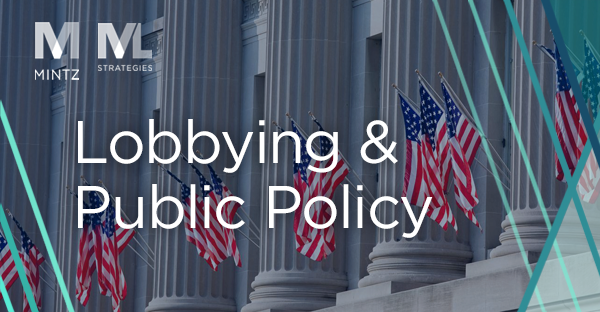
ML Strategies
Viewpoints
Filter by:
FTC Advises Copyright Office on AI — AI: The Washington Report
November 16, 2023 | Article | By Bruce Sokler, Alexander Hecht, Christian Tamotsu Fjeld, Raj Gambhir
Read about the Copyright Office’s request for comments on issues regarding AI and copyright and the FTC’s submission in response in the latest edition of AI: The Washington Report, a joint undertaking of Mintz and ML Strategies covering potential federal legislative, executive, and regulatory activities related to AI.
OMB Releases Draft Guidance to Agencies on Implementing Biden’s AI Executive Order — AI: The Washington Report
November 9, 2023 | Advisory | By Bruce Sokler, Alexander Hecht, Christian Tamotsu Fjeld, Raj Gambhir
Read about the OMB’s draft memorandum providing guidance to agencies on how to implement President Biden’s executive order on AI, the UK’s AI Safety Summit, and the Bletchley Declaration that emerged from the summit in the latest edition of AI: The Washington Report, a joint undertaking of Mintz and ML Strategies covering potential federal legislative, executive, and regulatory activities related to AI.
US-Canada Critical Mineral, EV Battery, and Semiconductor Cross-Border Supply Chain Issues
November 6, 2023 | Article | By John Lushetsky, Matthew T. Simpson, Paul Dickerson, Raj Gambhir
Senior VP of ML Strategies John Lushetsky, Private Equity Practice Co-chair Matthew T. Simpson, Member Paul H. Dickerson, and Project Analyst Raj Gambhir delve into the transformative landscape of cross-border supply chains for critical minerals, EV batteries, and semiconductors. Navigating the intricacies of the Inflation Reduction Act, Defense Production Act, and tax credits, the authors highlight how Canadian companies, considered ‘domestic’ under certain legislations, can harness funding and benefits.
Biden’s Executive Order on Artificial Intelligence — AI: The Washington Report
October 31, 2023 | Article | By Bruce Sokler, Alexander Hecht, Christian Tamotsu Fjeld, Raj Gambhir
President Biden issued his long-expected executive order on AI addressing workforce training and modernization, privacy, equity and civil rights, safety and security, competition and consumer protection, R&D investments, and government use of AI. Mintz Antitrust Practice Co-chair Bruce Sokler, with ML Strategies’ EVP and Director of Operations Alex Hecht and SVP Christian Fjeld, cover this development in their latest weekly update on AI-related activity in Washington, DC.
AI and Chips: Biden Admin Announces New Export Controls on AI Chips — AI: The Washington Report
October 27, 2023 | Article | By Bruce Sokler, Alexander Hecht, Christian Tamotsu Fjeld, Raj Gambhir
Read about Biden’s recently announced restrictions on the export of AI chips and chip manufacturing equipment to China in the latest edition of AI: The Washington Report, a joint undertaking of Mintz and ML Strategies covering potential federal legislative, executive, and regulatory activities related to AI.
Foreshadowing Biden’s AI Executive Order? — AI: The Washington Report
October 20, 2023 | Article | By Bruce Sokler, Alexander Hecht, Christian Tamotsu Fjeld, Raj Gambhir
Read emerging insights on an AI-focused executive order expected from the Biden administration sometime this fall in the latest edition of AI: The Washington Report, a joint undertaking of Mintz and ML Strategies covering potential federal legislative, executive, and regulatory activities related to AI.
Financial Protection and Autonomous Systems: Recent CFPB Actions Focused on AI — AI: The Washington Report
October 12, 2023 | Article | By Bruce Sokler, Alexander Hecht, Christian Tamotsu Fjeld, Raj Gambhir
Read about recent CFPB actions focused on AI in the latest edition of AI: The Washington Report, a joint undertaking of Mintz and ML Strategies covering potential federal legislative, executive, and regulatory activities related to AI.
FTC Chair Lina Khan: No AI Exemptions — AI: The Washington Report
October 6, 2023 | Article | By Bruce Sokler, Alexander Hecht, Christian Tamotsu Fjeld, Raj Gambhir
Read about the FTC’s recent “Creative Economy and Generative AI” roundtable discussion, which featured professionals from a variety of creative fields, in the latest edition of AI: The Washington Report, a joint undertaking of Mintz and ML Strategies covering potential federal legislative, executive, and regulatory activities related to AI.
Continue to Watch Out for the FTC — AI: The Washington Report
September 29, 2023 | Article | By Bruce Sokler, Alexander Hecht, Christian Tamotsu Fjeld, Raj Gambhir
Read about FTC indications of its intent to regulate AI and a recently introduced bill that would boost the agency’s authority and resources to regulate the use of this technology in the latest edition of AI: The Washington Report, a joint undertaking of Mintz and ML Strategies covering potential federal legislative, executive, and regulatory activities related to AI.
Announcing the Mintz Federal AI Legislation Tracker — AI: The Washington Report
September 13, 2023 | Article | By Bruce Sokler, Alexander Hecht, Christian Tamotsu Fjeld, Raj Gambhir
In this edition of AI: The Washington Report, read about Mintz’s Federal AI Legislation Tracker, which tracks bills pending in Congress that primarily concern AI regulation or that would institute significant regulations, policies, or programs concerning AI.
AI Regulation is Here. Are you Prepared? (Part 1: Unfair or Deceptive Conduct) — AI: The Washington Report
September 8, 2023 | Article | By Bruce Sokler, Alexander Hecht, Christian Tamotsu Fjeld, Raj Gambhir
In the first of a multi-part series, our team examines trends in AI regulation and the impact it will have on businesses that use it.
FTC Files Complaint on AI-Related Misleading Claims — AI: The Washington Report
September 1, 2023 | Article | By Robert Kidwell, Bruce Sokler, Alexander Hecht, Christian Tamotsu Fjeld, Raj Gambhir
Read about the FTC’s complaint against Automated AI and affiliated entities and individuals over AI-related misleading claims in the latest edition of AI: The Washington Report, a joint undertaking of Mintz and ML Strategies covering potential federal legislative, executive, and regulatory activities related to AI.
FCC and NSF Workshop on AI for Communications Networks and Consumers — AI: The Washington Report
July 20, 2023 | Article | By Christen B'anca Glenn
Read the latest edition of AI: The Washington Report, a joint undertaking of Mintz and ML Strategies covering potential federal legislative, executive, and regulatory activities related to AI, including a recent FCC and NSF Workshop on AI’s implications for communications networks and consumers.
The FTC Is Lurking — AI: The Washington Report
July 12, 2023 | Article | By Bruce Sokler, Alexander Hecht, Christian Tamotsu Fjeld, Raj Gambhir
Read the latest edition of AI: The Washington Report, a joint undertaking of Mintz and ML Strategies covering potential federal legislative, executive, and regulatory activities related to AI, including the FTC’s enforcement actions and guidance related to AI.
The National AI Commission Act — AI: The Washington Report
July 5, 2023 | Article | By Bruce Sokler, Alexander Hecht, Christian Tamotsu Fjeld, Raj Gambhir
Read the latest edition of AI: The Washington Report, a joint undertaking of Mintz and ML Strategies covering potential federal legislative, executive, and regulatory activities related to AI, including the newly introduced National AI Commission Act that seeks to establish a commission to formulate a legislative framework on AI.
Advancing the SAFE Innovation in the AI Age Framework — AI: The Washington Report
June 23, 2023 | Article | By Bruce Sokler, Alexander Hecht, Christian Tamotsu Fjeld, Raj Gambhir
The accelerating advances in AI have heightened legislative, executive, and regulatory activities focused on its implications. In a series of articles, Mintz and ML Strategies explore the federal government’s actions in this area, such as the national AI strategic plan and upcoming US Senate forums aimed at forging consensus and informing future legislation.
New AI Disclosure Bill and AI Strategic Plan Update — AI: The Washington Report
June 13, 2023 | Article | By Bruce Sokler, Alexander Hecht, Christian Tamotsu Fjeld, Raj Gambhir
Read the second edition of AI: The Washington Report, a joint undertaking of Mintz and ML Strategies covering potential federal legislative, executive, or regulatory activities related to AI.
National Priorities for Artificial Intelligence — AI: The Washington Report
June 8, 2023 | Article | By Bruce Sokler, Alexander Hecht, Christian Tamotsu Fjeld, Raj Gambhir
Read the inaugural issue of AI: The Washington Report, a joint undertaking of Mintz and ML Strategies covering potential federal legislative, executive, or regulatory activities related to AI.
Post-Election 2022: A Look into the Next Congress
November 22, 2022 | Blog | By Anthony DeMaio, Pamela Mejia
Energy & Sustainability Washington Update — October 2022
October 4, 2022 | Article | By R. Neal Martin
Our October 2022 Energy & Sustainability Washington Update covers the ongoing rollout of IRA clean energy provisions, the status of the energy permitting bill, Bipartisan Infrastructure Law opportunities, and National Clean Energy Week.
Explore Other Viewpoints:
- Data Centers & Digital Infrastructure
- AI: The Washington Report
- Antitrust
- Appellate
- Arbitration, Mediation & Alternate Dispute Resolution
- Artificial Intelligence
- Awards
- Bankruptcy & Restructuring
- California Land Use
- Cannabis
- Class Action
- Complex Commercial Litigation
- Construction
- Consumer Product Safety
- Corporate Governance (ESG)
- Cross-Border Asset Recovery
- DEI Legal Developments
- Debt Financing
- Direct Investing (M&A)
- Diversity
- EB-5 Financing
- Education & Nonprofits
- Employment
- EnforceMintz
- Environmental (ESG)
- Environmental Enforcement Defense
- Environmental Law
- Environmental, Social, and Corporate Governance (ESG)
- FDA Regulatory
- False Claims Act
- Federal Circuit Appeals
- Financial Institution Litigation
- Government Law
- Growth Equity
- Health Care
- Health Care Compliance, Fraud and Abuse, & Regulatory Counseling
- Health Care Enforcement & Investigations
- Health Care Transactions
- Health Information Privacy & Security
- IP Due Diligence
- IPRs & Other Post Grant Proceedings
- Immigration
- Impacts of a New US Administration
- Insolvency & Creditor Rights Litigation
- Institutional Investor Class Action Recovery
- Insurance & Financial Services
- Insurance Consulting & Risk Management
- Insurance and Reinsurance Problem-Solving & Dispute Resolution
- Intellectual Property
- Investment Funds
- Israel
- Licensing & Technology Transactions
- Life Sciences
- Litigation & Investigations
- M&A Litigation
- ML Strategies
- Medicare, Medicaid and Commercial Coverage & Reimbursement
- Mergers & Acquisitions
- Patent Litigation
- Patent Prosecution & Strategic Counseling
- Pharmacy Benefits and PBM Contracting
- Portfolio Companies
- Privacy & Cybersecurity
- Private Client
- Private Equity
- Pro Bono
- Probate & Fiduciary Litigation
- Products Liability & Complex Tort
- Projects & Infrastructure
- Public Finance
- Real Estate Litigation
- Real Estate Transactions
- Real Estate, Construction & Infrastructure
- Retail & Consumer Products
- Securities & Capital Markets
- Securities Litigation
- Social (ESG)
- Special Purpose Acquisition Company (SPACs)
- Sports & Entertainment
- State Attorneys General
- Strategic IP Monetization & Licensing
- Sustainable Energy & Infrastructure
- Tax
- Technology
- Technology, Communications & Media
- Technology, Communications & Media Litigation
- Trade Secrets
- Trademark & Copyright
- Trademark Litigation
- Unified Patent Court (UPC)
- Value-Based Care
- Venture Capital & Emerging Companies
- White Collar Defense & Government Investigations
- Women's Health and Technology




